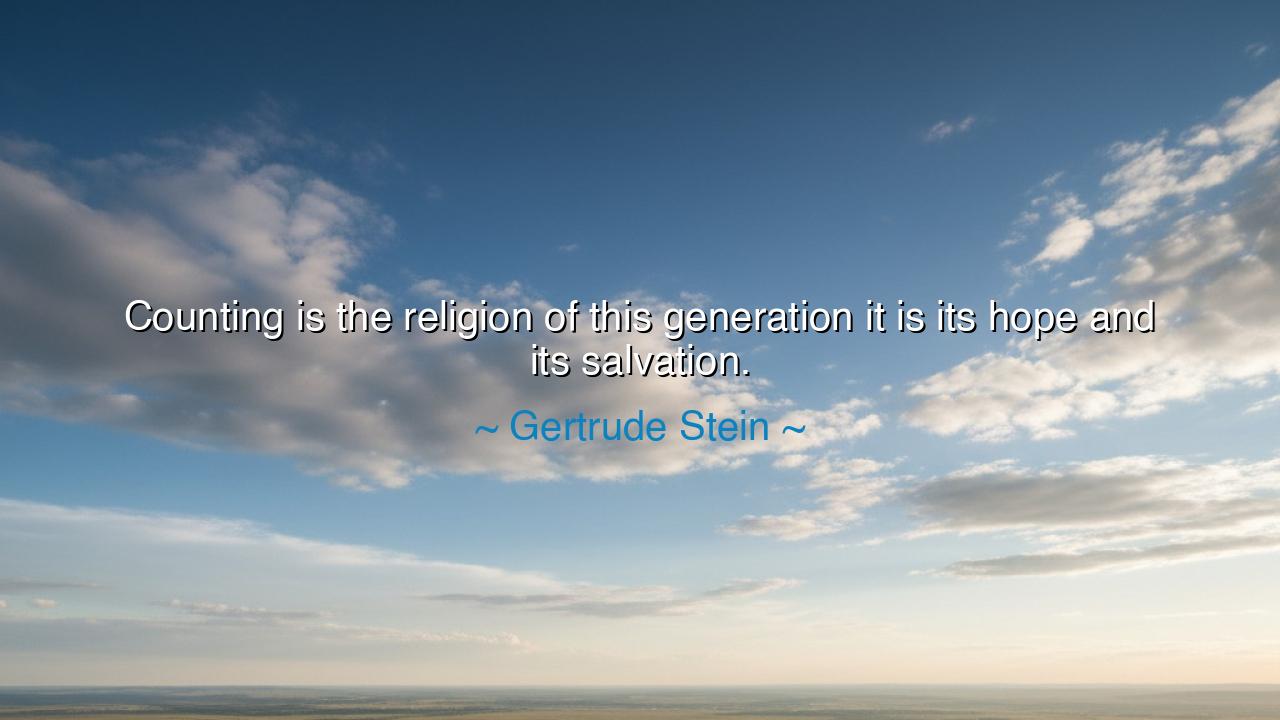
Counting is the religion of this generation it is its hope and






The words of Gertrude Stein, “Counting is the religion of this generation; it is its hope and its salvation,” are both a revelation and a warning. They come from a woman who lived at the dawn of the modern age — an era intoxicated by progress, machines, and measurement. In this brief, striking sentence, Stein captures the spirit of her time: a generation that had begun to worship numbers, to measure worth in figures, and to seek certainty through calculation. To her, “counting” was not merely arithmetic; it was a symbol of humanity’s desperate search for order in a world that had grown chaotic. But hidden within her words is a question that pierces the ages: What happens when man begins to count everything, even the uncountable — love, beauty, the soul?
Stein spoke as both poet and prophet. She saw that the modern world, in its quest for precision, was losing its sense of mystery. To count is to confine; it is to bind reality to what can be measured and weighed. Yet life’s greatest truths — compassion, imagination, purpose — cannot be placed in ledgers or charts. Stein’s generation, emerging from the ruins of war and the rise of industry, sought salvation in systems and statistics, in the idea that what can be counted can be controlled. But in her quiet irony, she implies that this new religion of numbers may bring not salvation, but spiritual poverty. For when the soul begins to tally, it forgets how to wonder.
To the ancients, this warning would not be strange. The philosophers of Greece, while masters of mathematics, knew that wisdom began where numbers ended. Pythagoras himself, who saw harmony in number, also taught that the divine could never be captured by mere calculation. The stars could be measured, but not their meaning; the body could be dissected, but not the spark within it. Stein’s words echo this same eternal wisdom: that the modern worship of data and quantification risks creating a civilization rich in information but poor in understanding. The ancients measured to honor the cosmos; the moderns count to control it.
Consider the story of the Industrial Revolution. It brought wealth, invention, and power — but also a new way of seeing humanity. Men became “labor units,” women “productive capacities,” and children “economic burdens.” Progress was calculated in profit, not in human flourishing. The same tools that built empires also built factories of despair. The religion of counting had begun: efficiency became god, and humanity its sacrifice. Yet out of that darkness arose the voices of poets, philosophers, and reformers — those who refused to be reduced to numbers. They reminded the world that salvation lies not in counting men, but in valuing them.
Stein’s quote also speaks to our own time, even more than hers. Today, we count followers instead of friends, clicks instead of conversations, profits instead of purpose. We track our steps, our sleep, our worth. The ancient hunger for meaning has been replaced by the addiction to measurement. But the soul, unlike numbers, does not multiply by division. Counting cannot heal the heart. It may organize the world, but it cannot save it. The modern mind, Stein suggests, must remember that salvation lies not in accumulation, but in awareness — not in measuring life, but in living it fully.
Yet, there is wisdom even in counting, if it is done with reverence. Numbers, when used rightly, reveal patterns — the breath of creation, the order of the stars, the symmetry of music and art. The danger lies not in counting itself, but in forgetting why we count. When we measure to understand, we serve truth; when we measure to dominate, we serve vanity. The sacred task is to balance reason and wonder, to let the heart and the mind walk together, as the ancients once did. For the human being is both poet and mathematician, both dreamer and builder.
So, let this teaching settle in your soul: Do not make a god of numbers. Count your blessings, but not your worth. Measure your days, but not your joy. Let reason guide you, but let love define you. For though “counting” may be the religion of this generation, salvation will always belong to those who remember what cannot be counted — the unmeasurable beauty of kindness, imagination, and hope.
And when the world tells you to quantify everything, answer as the ancients might have: “I will count stars to marvel, not to own; I will count days to cherish, not to waste; and I will count people not by number, but by the light they bring.” For in that way alone can counting become sacred again — not as a religion of control, but as a hymn of gratitude to the infinite.






AAdministratorAdministrator
Welcome, honored guests. Please leave a comment, we will respond soon